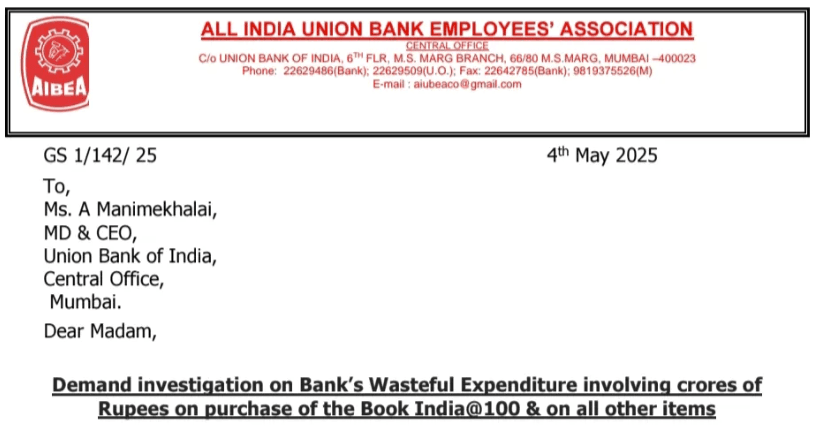
Union Bank Faces Heat Over Crores Spent on Book Purchase: Employees Demand Probe into ‘India@100’ Deal
Union Bank of India, a prominent public sector lender, is at the center of a growing controversy after it reportedly spent crores of rupees on the bulk purchase of the book India@100, written by K.V. Subramanian, former Chief Economic Advisor to the Government of India and current Executive Director at the International Monetary Fund (IMF).
The move has sparked strong criticism from the All India Union Bank Employees’ Association (AIUBEA), which is now demanding a full-fledged investigation into what it terms “wasteful and questionable expenditure” by the bank.
What is India@100 and Why Is It Controversial?
India@100 is authored by K.V. Subramanian, who served as India’s Chief Economic Advisor until 2021. The book envisions India’s economic and developmental goals for its 100th year of independence in 2047. While the subject matter is intellectually relevant, the controversy arises from Union Bank’s decision to procure thousands of copies of this book, incurring expenses that run into crores — all without a transparent justification on how the purchase benefits the bank or its customers.
The AIUBEA alleges that such a bulk purchase may amount to misuse of authority and public funds, especially considering the author’s prior government affiliation. The timing and scale of the purchase have intensified suspicions of favoritism and conflict of interest.
What the Employees Are Saying
The AIUBEA, which represents a large section of Union Bank staff, has formally raised concerns with:
- Union Bank’s top management
- The Department of Financial Services (DFS)
- Regulatory and vigilance authorities
In its memorandum, the union has demanded:
- Full disclosure of the procurement process behind the book purchase.
- Clarification on how the book contributes to business development or staff productivity.
- Verification of adherence to Central Vigilance Commission (CVC) guidelines and procurement norms.
- An independent inquiry into whether the decision was influenced by the author’s past government position.
The union believes that such decisions undermine transparency, erode employee morale, and reflect poor governance.
Past Patterns of Alleged Wasteful Spending
This isn’t the first time Union Bank has faced criticism from its employee union regarding spending practices. AIUBEA has documented several cases of alleged financial mismanagement, including:
- Installation of unnecessary or redundant CCTV systems
- Lavish office renovations without operational need
- Procurement of electronic devices (scanners, hardware) without business justification
- Bulk purchases of non-essential materials, including books
These complaints were raised as part of the union’s opposition during earlier strike-related discussions with the Chief Labour Commissioner in 2024. While the bank defended these expenditures as part of “business promotion activities” approved by the Board, employee representatives remain unconvinced.
What the Bank Says
In a Memorandum of Understanding (MoU) signed on December 21, 2024, following negotiations related to the September 2024 strike notice, Union Bank management stated that the book purchase and other such expenditures were in line with marketing and branding strategies approved by the appropriate internal committees.
However, AIUBEA claims that such justifications are vague and fail to address accountability and return on investment, especially when public money is involved.
Why This Matters for Public Sector Banks and Customers
Public sector banks like Union Bank are custodians of public funds. Any misuse or questionable spending raises serious concerns about:
- Governance standards
- Financial discipline
- Public trust in the banking system
At a time when banks are focusing on digital transformation, NPA reduction, and improved service delivery, the allocation of funds to potentially non-essential expenses such as book purchases may set a dangerous precedent.
What Happens Next?
The controversy is now gaining traction, with employees, media, and financial observers calling for greater scrutiny. If an investigation is launched, it could lead to:
- Disciplinary action against decision-makers (if found guilty)
- Stricter procurement norms for all public sector banks
- Greater involvement of employee unions in financial oversight
Public Money Deserves Public Accountability
Whether or not the purchase of India@100 had noble intentions, the lack of transparency and measurable impact has made it a lightning rod for criticism. For a public sector institution like Union Bank of India, accountability is not optional — it is essential.
As pressure mounts, the bank’s next steps will be crucial in determining not just the outcome of this issue, but also its long-term reputation among employees, customers, and the general public.
Stay updated with Banking Insights for the latest on public sector banking news, financial policy changes, and employee welfare updates.
👉 Follow us on Telegram and WhatsApp for daily news alerts and insights.
